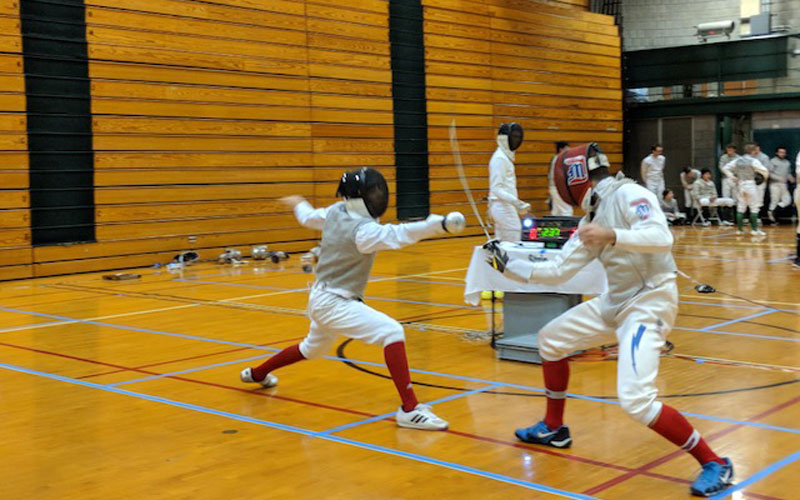
Among other things, mindfulness practices are great for calming and centering the mind - which is a great way to get ready for a match.
Denison’s fencing coach and English prof Peter Grandbois has incorporated mindfulness into his team’s fencing practices. “and so far the athletes seem to love it. We do 15 minutes of guided meditation at the end of three practices each week…we also do 15 minutes of yoga at the beginning of those three practices.”
A recent issue of USA Fencing’s Beyond the Box featured a profile of Grandbois, in which he discusses the benefits of mindfulness activities:
The head coach of the women’s NCAA fencing team at Denison University, which achieved varsity status in August, Peter Grandbois started the school’s club fencing program in 2011. He is an English professor as well as a veteran fencer who won a national championship in 2014.
How did you become interested in coaching?
I came to coaching late in my career. I’d been retired from competitive fencing for 17 years and felt the need to both get back into the sport and give back to the sport, so I started the fencing club where I teach English at Denison University. The club quickly morphed into a competitive club team and now a women’s varsity program.
How have you improved yourself as a coach?
When I first started coaching I thought it was all about technique and strategy. Those are important, but now I find myself focusing more on getting to know the whole athlete. I spend time talking to them about how they are doing. How stressed are they? How much sleep are they getting? What do they want to get out of their fencing today? The feedback I get is extremely helpful in knowing how to approach them in the lesson and in practice/meets on that particular day.
Do you have any common words/phrases you use when coaching?
The biggest thing I’ve realized over the years is the importance of getting the student athletes to slow down in terms of their lives and relax and focus. Most of my communication now is centered around telling them to breathe and relax during lessons, practices, and meets. The results are immediately apparent as they learn to be more mindful of themselves and their fencing. So yes, “Breathe” is a big one. “Let go” is another, or “Be water,” or “See the space around you.”
How do you measure your athletes’ improvement/success?
That depends a lot on how you define success. The traditional metric is results in tournaments, and, while those are important, it’s more important to me that the athletes reflect on what’s important to them and set their own goals. To accomplish this, I ask each athlete to write me a page-long thought paper at the beginning of the season where they tell me: A. Why they are fencing and B. What they hope to accomplish during the year and C. How THEY will measure that accomplishment. Their goals may simply be to make friends or they may be to earn a rating or place in a certain tournament. We revisit their goals throughout the year. It’s important that the student athlete comes up both with their own goals AND how they will measure them. At the end of the year, they write me a similar letter in which they reflect on their season.
At the collegiate level, how do you make a good fencer a great one? How do you get them to take the next step in their fencing progression?
Part of the answer is that you have to get them to OWN their improvement and goals. They have to buy into what they want to accomplish. Secondly, since collegiate fencing is much more team-oriented than fencing outside the college level, you have to set up a team expectation of “deliberate practice,” i.e. you have to get the team to buy into the idea that they must coach each other. My fencers reflect together on each moment in practice, each action in a bout. We train them to ask each other after every touch “What happened? How did I get hit? or how did I hit my opponent? And finally, what could I have done differently? We break each action down into technique, tactics, timing, distance, and speed. It’s a strategy I learned from Michael Marx. Of course, I also believe it’s important to push them to attend as many NACs and ROCs as possible to up their challenge level in tournaments.